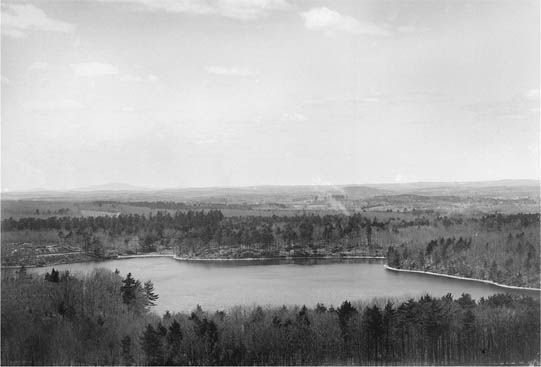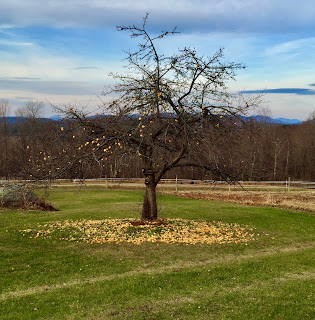 |
| November 30, 2015 |
River skimmed over behind Dodd’s and elsewhere. Got in my boat. River remained iced over all day.
On the 27th, when I made my last voyage for the season, I found a large sound pine log about four feet long floating, and brought it home. Off the larger end I sawed two wheels, about a foot in diameter and seven or eight inches thick, and I fitted to them an axle-tree made of a joist, which also I found in the river, and thus I had a convenient pair of wheels on which to get my boat up and roll it about.
The assessors called me into their office this year and said they wished to get an inventory of my property; asked if I had any real estate. No. Any notes at interest or railroad shares? No. Any taxable property? None that I knew of. “I own a boat,” I said; and one of them thought that that might come under the head of a pleasure carriage, which is taxable. Now that I have wheels to it, it comes nearer to it.
I was pleased to get my boat in by this means rather than on a borrowed wheelbarrow. It was fit that the river should furnish the material, and that in my last voyage on it, when the ice reminded me that it was time to put it in winter quarters.
I am waiting for colder weather to survey a swamp, now inaccessible on account of the water.
This evening I received Cholmondeley’s gift of Indian books, forty-four volumes in all, which came by the Canada, reaching Boston on the morning of the '24th. Left Liverpool the 10th.
H. D. Thoreau, Journal, November 30, 1855
Got in my boat. See Letter to Blake, December 9, 1855 ("You should have been here to help me get in my boat. The last time I used it, November 27th, paddling up the Assabet, I saw a great round pine log sunk deep in the water, and with labor got it aboard. When I was floating this home so gently, it occurred to me why I had found it. It was to make wheels with to roll my boat into winter quarters upon. So I sawed off two thick rollers from one end, pierced them for wheels, and then of a joist which I had found drifting on the river in the summer I made an axletree, and on this I rolled my boat out.") See also November 30, 1854 ("Sail down river. No ice, but strong cold wind."); December 5, 1856 ("I love to have the river closed up for a season to be obliged to get my boat in . . .I love best to have each thing in its season only and enjoy doing without it at all other times.") and A Book of the Seasons: Boat in. Boat out.
This evening I received Cholmondeley’s gift of Indian books, forty-four volumes in all. See November 9, 1855 ("Yesterday I got a perfectly sound oak timber . . . As it was too heavy to lift aboard, I towed it. As I shall want some shelves to put my Oriental books on, I shall begin to save boards now."); November 16, 1855 ("I have been making shelves for my Oriental books, which I hear to-day are now on the Atlantic in the Canada")
Thomas Cholmondeley had shipped Thoreau a rare collection of forty-four books on Oriental subjects including the Rig Veda Sanhita, the Madukya Upankishads, the Nala and Damyanta, the Vishnu Purana, the Institutes of Menu the Sankhya Karika, the Aphorisms of the Mimasma andd Nayaya, the Bhagavat Gheeta, Sakoontala and the Bhagavita Purana (Days of Henry Thoreau, 347). Thoreau wrote Cholmondeley on November 8, 1855, “I must endeavor to thank you for your magnificent, your princely gift to me,” and in 1857 sent Cholmondeley his Week, Emerson's poems, and Walt Whitman's Leaves of Grass.
He wrote to Blake: "My books did not arrive till November 30th, the cargo of the Asia having been complete when they reached Liverpool. I have arranged them in a case which I made in the mean while, partly of river boards. I have not dipped far into the new ones yet. One is splendidly bound and illuminated. They are in English, French, Latin, Greek, and Sanscrit. I have not made out the significance of this godsend yet." (Letter to Blake, December 9, 1855)
He wrote to Ricketson: "Cholmondeley . . has caused to be forwarded to me . . . a royal gift, in the shape of twentyone distinct works (one in nine volumes, — forty-four volumes in all), almost exclusively relating to ancient Hindoo literature, and scarcely one of them to be bought in America. I am familiar with many of them, and know how to prize them. I send you information of this as I might of the birth of a child. (Letter to Ricketson, December 25, 1855)
Among the books Thoreau already knew were the Vishnu Purana, The Laws of Menu, the Bhagavadgita, the Samkhya Karika, and the Sacontala. There were other Hindu texts that were new to him, such as the Rig Veda. (Concord Library)
Sanborn writes, "They arrived, November 30,1855, and I saw them soon after, in a new case which Thoreau had just made for them, out of driftwood that he brought home from his afternoon voyages on the river. . . Several of them, and their cases are now mine." (FB Sanborn, Life of Thoreau 305 (1917))
The ice reminds me
it is time to put my boat
in winter quarters.


















